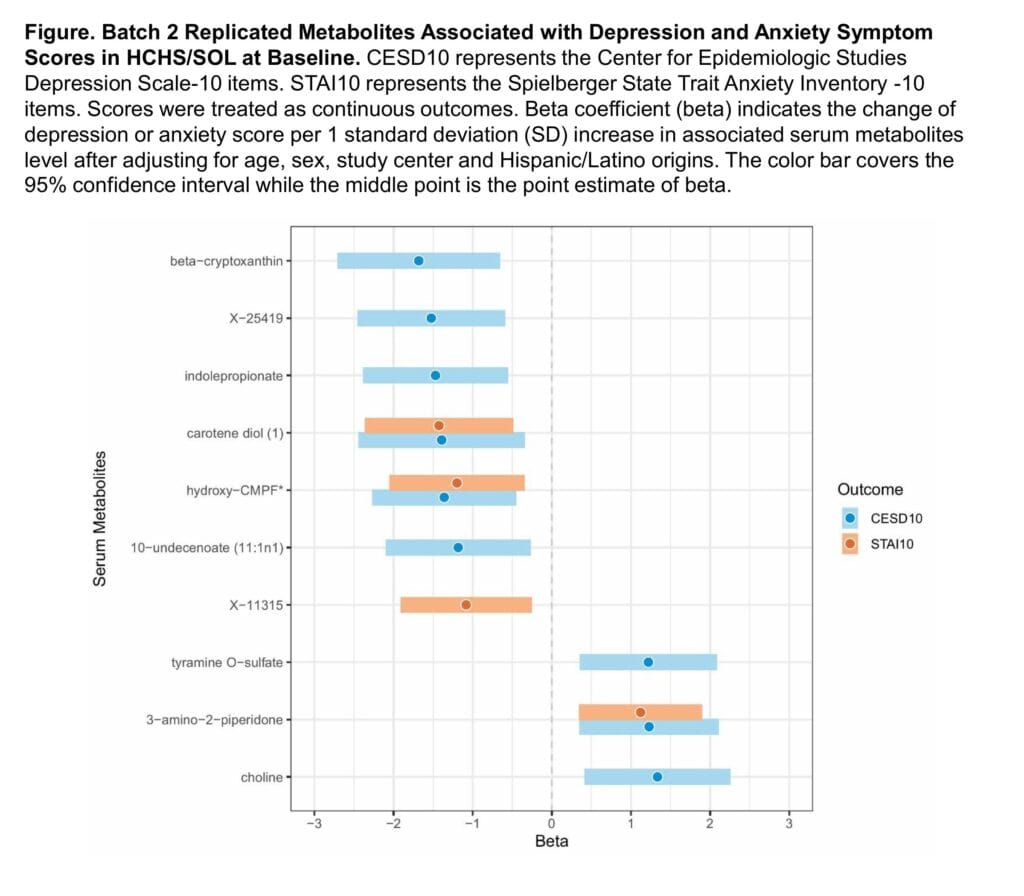Mental Health
Serum Metabolites Associated with Depression and Anxiety in Hispanic Community Health Study/Study of Latinos Xinye Qiu* Xinye Qiu Yu Zhang Qibin Qi Bing Yu Jan Bressler Carmen Isasi Linda Gallo Tamar Sofer
Establishment of relevant molecular profiles may aid in early identification of at-risk individuals for targeted intervention. We aim to identify serum metabolomic signatures for depression and anxiety in the Hispanic Community Health Study/Study of Latinos (HCHS/SOL). We performed metabolome-wide association analyses for depression and anxiety symptoms measured by Center for Epidemiologic Studies Depression Scale-10 (CES-D-10) and Spielberger State Trait Anxiety Inventory -10 items (STAI-10) among 4,002 Hispanic/Latino adults who participated at baseline clinic visit and had metabolomics assayed in 2017 (batch 1). False-discovery-rate (FDR) correction was applied to address multiple testing. Replication was conducted using metabolites with FDR p<0.05 in the discovery stage in a separate set of 2,178 individuals from baseline, and had metabolomic assayed in 2021 (batch 2). Depression and anxiety symptoms were modeled as continuous outcomes in a survey-based generalized linear regression for each metabolite, separately. Participants were 42.6% males with an average age of 45.9 yrs and an average BMI of 29.8 kg/m2. We identified 35 metabolites (9 replicated in batch 2) associated with depression symptoms, and 10 (4 replicated) with anxiety symptoms adjusting for age, sex, study center and Hispanic/Latino background. Carotene diol and hydroxy-CMPF were associated with lower depression and anxiety symptoms. In addition, we found that 3-amino-2-piperdone was linked to higher symptoms (depression p=0.03; anxiety p=0.02). Tyramine O-sulfate and choline were also linked to higher depression symptoms (both p=0.03). Other metabolites uniquely linked to lower depression symptoms were beta-cryptoxanthin (p=0.02), unknown X-25419 (p=0.02), indolepropionate (p=0.02), and 10-undecenoate (11:1n1) (p=0.04). Details are shown in the attached Figure. After further accounting for income, education, smoking, alcohol, exercise and diet, carotene diol remained associated with lower depression symptoms (p=0.02). Associated biological pathways include antioxidation, furan/long chain omega-3 fatty acids metabolism, lipids metabolism, and microbial metabolic pathways. In summary, we identified several serum metabolites associated with psychological symptoms in Hispanic/Latino adults.

